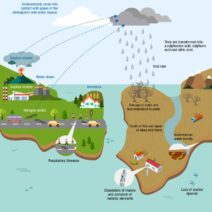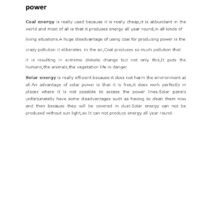As we navigate the intricate landscape of climate change, a peculiar hypothesis has emerged that challenges conventional wisdom—could the specter of nuclear war inadvertently mitigate global warming? This compelling notion, often dismissed at first glance, invites a deeper investigation into the relationship between human conflicts and the Earth’s climatic systems. To understand this paradox, one must first unpack the mechanics of climate change and the historical precedents that inform this audacious theory.
Climate change, driven primarily by anthropogenic greenhouse gas emissions, has led to uncontrollable temperature rises, melting ice caps, and increasingly volatile weather patterns. Efforts to combat this crisis have long emphasized collective action, renewable energy, and sustainable practices. However, the hypothesis of “nuclear cooling” presents a striking alternative perspective—one that considers the potential climatic consequences of deliberate, catastrophic events such as nuclear warfare.
At its core, the concept of nuclear cooling posits that a large-scale nuclear conflict could unleash vast amounts of soot and debris into the stratosphere. These particles could form a curtain that blocks sunlight, potentially lowering global temperatures in what has been termed “nuclear winter.” Research conducted by climatologists and atmospheric scientists suggests that even a limited exchange of nuclear weapons could generate enough particulate matter to cause significant short-term cooling effects, comparable to the impact of large volcanic eruptions.
While the prospect of using warfare as a mechanism to address climate change might evoke moral outrage, it compels a critical examination of historical events that resulted in humankind experiencing unintentional climate modulation. For instance, the 1815 eruption of Mount Tambora led to a ‘volcanic winter’ that caused global temperatures to plummet, resulting in widespread agricultural failures and reflected light from the sun back into space. This historical event underscores how natural disasters can have profound effects on climate—not unlike the hypothetical aftermath of a nuclear conflict.
However, the notion of leveraging war to engender environmental benefits is fraught with ethical dilemmas and existential risks. The catastrophic outcomes of nuclear warfare extend far beyond immediate climatic effects; they include immense human suffering, loss of life, and irreversible damage to ecosystems. Thus, while the hypothesis may offer a novel angle on climate change mitigation, the moral imperatives suggest that such outcomes are fundamentally unacceptable.
Furthermore, the effects of nuclear cooling would be neither uniform nor predictable. The deployment of nuclear weapons would likely precipitate chaos and destabilization, exacerbating tensions among affected regions. The socio-political landscape during such a crisis would be fraught with peril, raising questions about governance, humanitarian response, and global solidarity. Thus, the scenario beckons serious contemplation regarding the volition behind the mechanism of climate cooling.
Even the staunchest proponents of the nuclear cooling thesis acknowledge that the long-term climate impacts remain uncertain. As observed from the past, the complexities of atmospheric interactions can yield unpredictable results. Therefore, while short-term cooling might ensue following a nuclear conflict, the subsequent long-term ecological ramifications could be detrimental, including the potential for instabilities in weather patterns that might initially seem changed for the better.
Editions of this hypothesis have led some thinkers to propose diversifying policy approaches—integrating climate action with discussions on nuclear disarmament. Through viewing climate change as an issue intimately intertwined with global security, advocates can spotlight the need for collaboration rather than conflict. By doing so, the broader spectrum of environmental responsibility can be illuminated, prompting a more nuanced discussion on how humanity can confront both nuclear threats and climate crisis simultaneously.
Importantly, the discourse surrounding nuclear cooling must also consider contemporary developments in climate engineering. Strategies such as solar radiation management (SRM), which involves reflecting sunlight to mitigate warming, bear resemblance to the unintended consequences that nuclear conflict might bring about. The ethical ramifications, efficacy, and geopolitical implications of such interventions require careful scrutiny, just as the idea of nuclear cooling does.
In contemplating these theories, it is vital for environmental advocates to reaffirm the foundational principles of stewardship and sustainability. Rather than consider warfare as a desperate remedy to climate woes, the imperative lies in galvanizing collective action toward a greener future. Advancements in renewable energy, reforestation efforts, and carbon sequestration must serve as focal points for policy-making and environmental activism.
As such, the appeal of the nuclear cooling hypothesis rests not in its viability as a strategy for climate action, but rather in its capacity to provoke a paradigm shift in how we perceive and address the challenges of global warming. It compels us to grapple with the intertwined nature of human actions—whether through conflict or cooperation—in shaping the planet’s future. Ultimately, the dialogue must be directed toward achieving environmental justice and protecting vulnerable populations, rather than speculating on the horrors of war as a form of climate intervention.
In summary, the exploration of nuclear cooling presents a fascinating, albeit distressing lens through which the interplay of warfare and climate change can be examined. The discourse it generates prompts urgent questions about our very humanity, our capacity for collaboration, and our responsibility to future generations. In striving for solutions to climate change, it is imperative to champion peace, sustainability, and resilience rather than to entertain the dystopian prospects of conflict as a means to an end.








